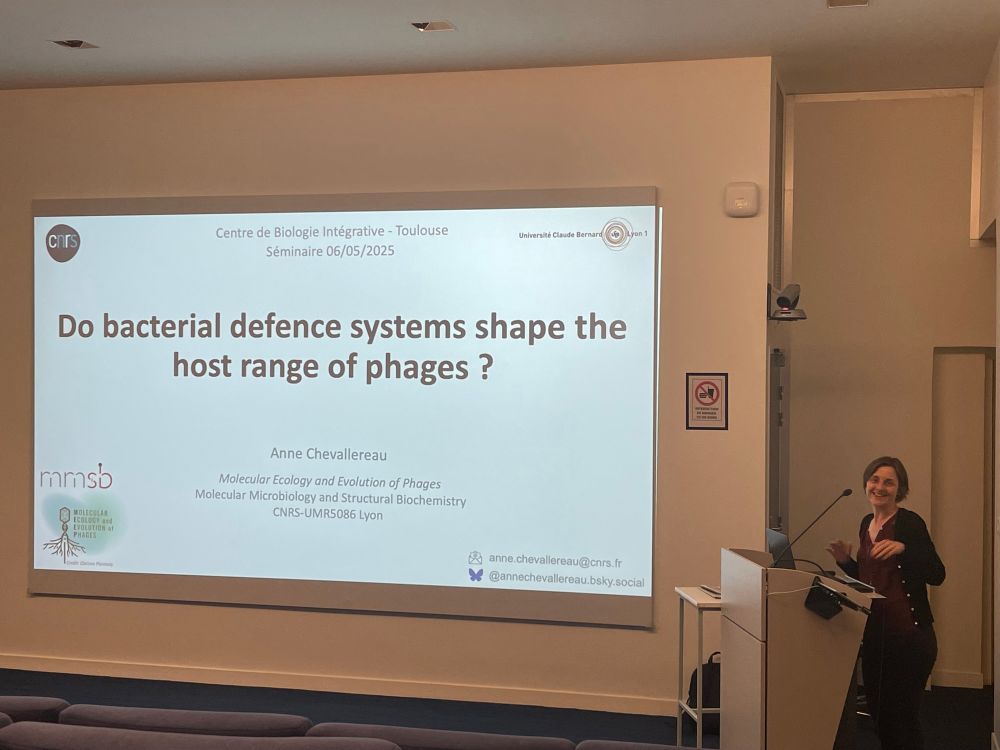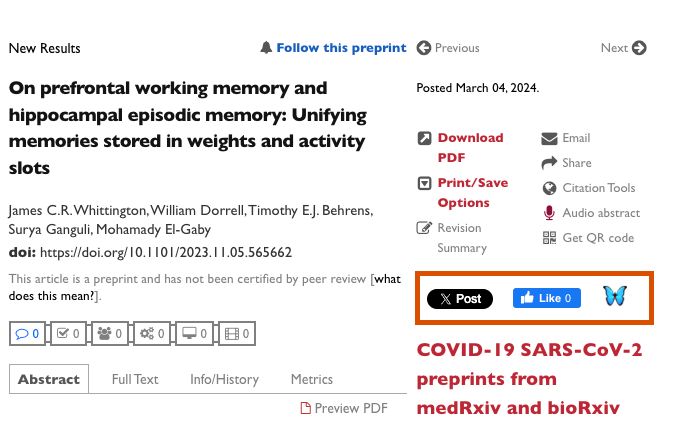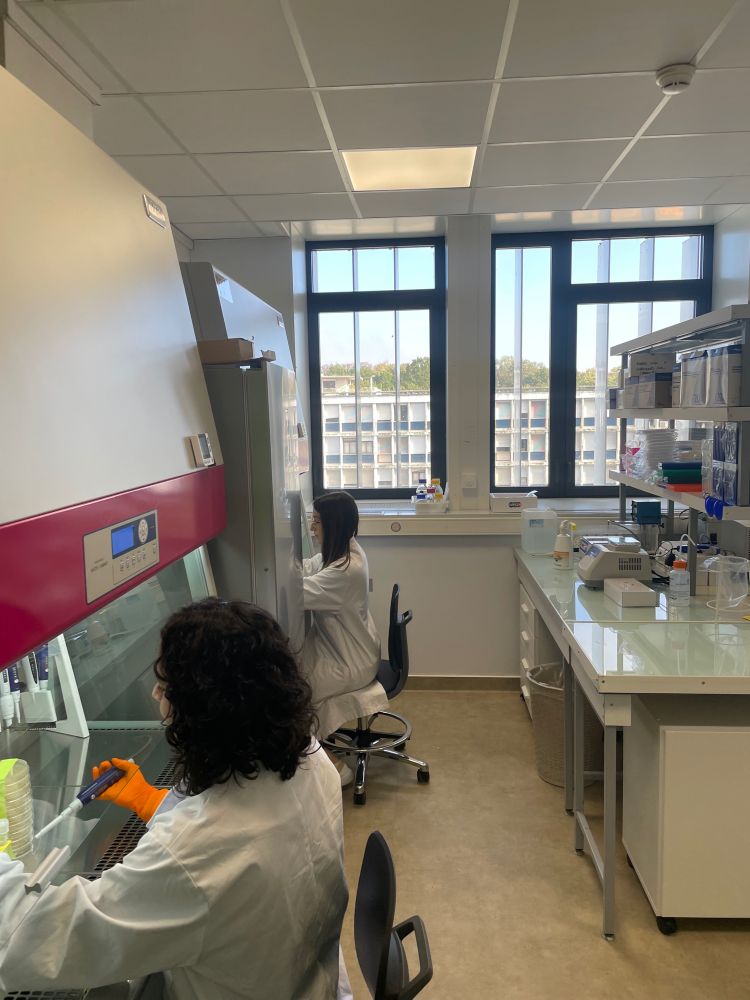
Hosting of Tatiana’s scientific talk @ CBI touliuse
Today we were thrilled to host @tatianadimitriu.bsky.social at @cbitoulouse.bsky.social @cnrsbiologie.bsky.social
She discussed factors contributing to plasmid spread (defense systems, environmental factors…) - with @benoitjpons.bsky.social
03.02.2026 23:11 — 👍 9 🔁 2 💬 1 📌 0

My team at @cbitoulouse.bsky.social is recruiting a postdoc #bioinformatics with solid experience in metagenomic analyses.
Interest in evolution, ecology & MGEs is important.
The offer stands until the perfect candidate is found, and it could be you 🫵
🔁 🙏
#microSky #phagesky #UTIsky
@cnrs.fr
15.01.2026 11:19 — 👍 27 🔁 55 💬 1 📌 0
Overall, we conclude that while CRISPR-immunity prevents bacteria from dying at high phage doses, a subpopulation undergoes SOS-response mediated growth defects and elongation. Conversely, surface-based resistant bacteria do not, thus favouring this type of resistance at high phage dose.
04.09.2025 16:02 — 👍 1 🔁 0 💬 0 📌 0

Flow cytometry graph showing that a subpopulation of CRISPR-immune bacteria is elongated and fluorescent (thus showing a SOS response activation) while surface-based resistant bacteria are homogeneously non-elongated non-fluorescent.
Finally, we used flux cytometry to confirm that the elongated phenotype was linked with SOS response induction.
04.09.2025 16:02 — 👍 2 🔁 0 💬 1 📌 0

Cumulative probability of division curves. Surface-based resistant bacteria are not affected by the presence of phage and the median time between two division is the same for all treatments. CRISPR-resistant bacteria median division time is slightly increased at low phage dose and significantly increased at high phage dose

Microfluidics image displaying bacteria of several different sizes. The one on the right hand side is elongated (8 times longer than a bacteria that just completed division)
However, we noticed some heterogeneity in the population, with some CRISPR-immune bacteria stalling and suffering from elongation, particularly at high phage doses, which is consistent with this second hypothesis
04.09.2025 16:02 — 👍 2 🔁 1 💬 1 📌 0
We then tested our second hypothesis, that CRISPR-immune bacteria were displayed growth defects compared to surface-based resistant bacteria at high phage doses. We did not observe a significant difference in growth rate at the whole population level.
04.09.2025 16:02 — 👍 1 🔁 0 💬 1 📌 0

Survival curves showing that both CRISPR-immune and surface-based resistant bacteria do not die from phage, regardless of the dose used
Our first hypothesis was that at high phage dose, surface-based resistance offered more protection than CRISPR-immunity. However, we showed that both types of defences offer a similar, almost perfect protection against phages regardless of the phage dose.
04.09.2025 16:02 — 👍 1 🔁 0 💬 1 📌 0

Typical image from a microfluidics experiment. One large channel at the bottom is linked to several tiny perpendicular channels in which bacteria are growing
While CRISPR-Cas system inability to fully prevent phage gene expression seemed to play a role, it was still unclear what was causing the apparent CRISPR-Cas fitness cost at high phage doses. Here we investigated two hypotheses by using a microfluidics set-up to follow single bacteria in microscopy.
04.09.2025 16:02 — 👍 1 🔁 0 💬 1 📌 0
Pseudomonas aeruginosa can choose between CRISPR-Cas immunity and resistance through surface receptor mutation to evade their phages foes. Previous work from the lab had shown that the choice depends on the strength of phage selection pressure, with CRISPR-immunity being favoured at low phage dose.
04.09.2025 16:02 — 👍 0 🔁 0 💬 1 📌 0

Lab picture - June 2025
The team is growing fast!
🎉 Congratulations to Léa Masson on receiving a PhD fellowship from the BSB doctoral school @universitetoulouse.bsky.social 👏
The PhD will be co-supervised by @benoitjpons.bsky.social and myself - @cbitoulouse.bsky.social
#PhD #Microbiology #Klebsiella
18.07.2025 14:24 — 👍 12 🔁 2 💬 1 📌 0
Thanks a lot for your insightful presentation! That was great to have you here in Toulouse! You're most welcome to visit us again anytime 😀
09.05.2025 17:09 — 👍 0 🔁 0 💬 0 📌 0
Had an amazing time at @cbitoulouse.bsky.social! Stimulating discussions, insightful questions, and always a joy to reconnect with old friends and colleagues!
Thanks for the invitation @benoitjpons.bsky.social @olayarendueles.bsky.social
09.05.2025 16:49 — 👍 6 🔁 2 💬 1 📌 0

Presentation of Anne Chevallereau
Great talk today @cbitoulouse.bsky.social from @annechevallereau.bsky.social- on the importance of surface receptors in phage adsorption and of intracellular phage defense mechanisms - and the relative importance of each of them in shaping phage host range &productive phage infection 🦠
06.05.2025 20:37 — 👍 14 🔁 3 💬 1 📌 1

A screenshot of a paper on bioarxiv illustrating the lack of blue sky share button!
Would you like to see @biorxivpreprint.bsky.social add a share to blue sky button?! I know I would! Share this post to let @richardsever.bsky.social @erictopol.bsky.social and others at bioarxiv know!
02.12.2024 12:10 — 👍 384 🔁 196 💬 9 📌 6
Looking for a PhD in phage ecology, metagenomics and defence systems? We have a fully funded PhD opportunity to join us at the University of York with great collaborators.
See here for more info:
www.findaphd.com/phds/project...
26.11.2024 16:40 — 👍 10 🔁 15 💬 0 📌 0

Lovely day @ CBI with our newest team members already working hard in our brand new lab. Check out the incredible #BlueSky in #Toulouse
#MicroSky
15.11.2024 10:37 — 👍 28 🔁 2 💬 0 📌 0
Research Assistant - AR2992DM
I'm recruiting a Research Technician to work on plasmid transmission and antimicrobial resistance in St Andrews, to start in October. Deadline for applications is 19 June. Please share!
www.vacancies.st-andrews.ac.uk/Vacancies/W/...
31.05.2024 07:37 — 👍 16 🔁 23 💬 0 📌 1
Just out in The ISME Journal, a paper from my time in the Westra lab. We find that the extent of phage exposure shapes subsequent resistance dynamics over longer timescales (up to 30 days).
And huge thanks to first authors @bridgetwatson.bsky.social and Loris for mammoth experiments!
11.01.2024 11:25 — 👍 15 🔁 9 💬 0 📌 0
Bacterial Genomes Adaptation_ CBI-Université de Toulouse 🇨🇵
Marine microbiologist with expertise in plastic pollution and antimicrobial resistance. Co-founder of Beach Guardian; aiming to empower communities against plastic pollution.
Bioinformatics Scientist / Next Generation Sequencing, Single Cell and Spatial Biology, Next Generation Proteomics, Liquid Biopsy, SynBio, AI/ML in biotech // http://albertvilella.substack.com
Group Leader and Adjunct Professor 🧑🏫 | Public Health | Data Engineering & Visualization | 🧬 Bioinformatics & 📈 Mass Spec Enthusiast | 📍 Berlin | Passionate About Collaboration and Open Science 🔬✨
Bachelor of Science in Medical Laboratory Science (BMLS), Head of Hygiene and Environmental Department at Baleng Laboratory (Medical Analysis, Water and Food Analysis"
Field of research: Clinical Microbiology and Environmental Microbiology
Microbes & mucus 🤩 | Gut Microbial Ecology | Wageningen University, NL
Microbiologist | Molecular Microbiology | Eco-physiology | Virology | Microbiome | Co-Evolution 4 Fit |
https://scholar.google.nl/citations?hl=en&user=4cUcmfMAAAAJ
Stressors, antibiotics, phages... anything that might upset bacteria!
Post-doc, Le Roux lab - Université de Montréal
PhD, Mazel Lab - Institut Pasteur
EMBO Postdoctiral Fellow in the Whitney lab at McMaster University, working on interbacterial warfare and phage defense
Post-doc at D-HEST, ETH Zurich. PhD in microbiology at Biozentrum, Basel. Phagehunter. Hiker. Scout. Music and food enthusiast. Per aspera ad astra
https://orcid.org/0000-0002-0751-9572
UW-Madison Microbiology PhD student in the @molabuw.bsky.social, studying phage infection in microbial communities. Microbial ecology & evolution. Fan of birds, books, bacteriophages, and Beckett.
Microbiome, microbial ecology, evolution and all stuff related to bacteria
Doctoral Researcher modeling protective symbiosis @mpi-evolbio.bsky.social
#evolutionary_theory | #epidemiology | #microbiology
Microbiologist, Research, Molecular genetics, DNA, Genome dynamics
Research Fellow at Northumbria University: phage, synthetic biology, sialic acid, transport proteins. He/him.
PhD-Student in the Kümmerli Lab @University of Zurich
Polymicrobial Interactions | Evolution | Pathogens | Bacteriophages using in-vitro models and omics
Microbiologist |microbial ecology | microbiome | phage-bacteria interactions
phages rule the world👀
Postdoc at Evolutionary Biology lab, Gulbenkian Institute for Molecular Medicine - Oeiras













